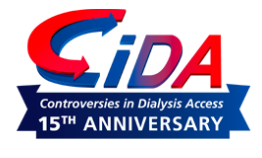Controversies in Dialysis Access (CiDA)
The Controversies in Dialysis Access (CiDA) meeting is a leading educational forum for surgeons, radiologists, nephrologists and medical staff who care for patients with a  dialysis access. Its accredited scientific program provides the a comprehensive, interactive education opportunity for all clinicians involved in the care and treatment of dialysis patients.
dialysis access. Its accredited scientific program provides the a comprehensive, interactive education opportunity for all clinicians involved in the care and treatment of dialysis patients.
Organized by Ingmar Davidson, MD, PhD, Tulane University, New Orleans, LA and Bart L. Dolmatch, MD, FSIR Palo Alto Medical Foundation, Mountain View, CA, the meeting has two components: first, a Hands-on Simulation of Dialysis Access (SoDA) training and then a two-day CiDA conference.
SoDA’s goal is to improve surgical and interventional skills through hands-on training with live patients, models with lifelike vessels and simulators. Modeled in-part after the airlines approach to improve flight safety, SoDA explores best practices in dialysis access to reduce complications through intensive, interactive, innovative, half-day learning opportunities designed to address the increasing challenges associated with vascular access technique and decision making. SoDA teaches improved, surgical and interventional skills, aiming to enhance physician decision making.
Attendance and participation at two-day CiDA meeting brings accreditation opportunities. CiDA outlines its goals for the learner as being able to:
- Assess ways to improve training in order to make sound clinical decisions.
- Recognize the benefits of effective communication in a multidisciplinary team setting to advance the care of dialysis patients.
- Analyze the benefits and drawbacks of different dialysis options for patients who need renal replacement.
- Identify risks and benefits of peritoneal and hemodialysis.
- Compare nontraditional approaches for arteriovenous access creation and intervention.
- Determine how best to make clinical decisions for patients with thoracic central vein obstruction (TCVO).
- Discuss factors that contribute to patient safety during dialysis access surgery and catheter-based intervention.
Their model is to have individual presentations on a topic and/or case reports followed questions and then a concluding panel discussion on a topic by prominent members of the organization in which panelists often adopt differing sides.
In 2018, SoDA and CiDA meeting will be held on October 31st – Nov. 2nd at Marriott Marquis, in Washington, D.C.
For more information, visit: http:// dialysiscontroversies.com




